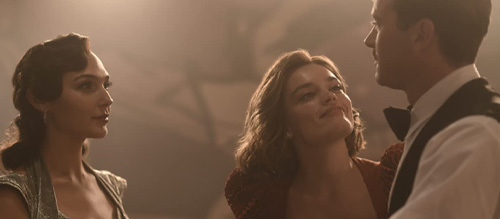Death on the Nile (2022) Review
Death on the Nile (2022)
Director: Kenneth Branagh
Screenwriters: Michael Green
Starring: Kenneth Branagh, Gal Gadot, Tom Bateman, Russell Brand, Sophie Okonedo, Letitia Wright, Emma Mackey, Dawn French, Armie Hammer, Jennifer Saunders, Annette Bening
Sir Kenneth Branagh’s interpretation of Agatha Christie’s famous Belgian detective returns for another round of suspicion and paranoia. In this 2022 adaptation, Hercule Poirot (Branagh) finds himself in Egypt with a group of tourists, including the wealthy heiress Linnet Ridgeway (Gal Gadot) and her husband, Simon Doyle (Armie Hammer). But all is not as it seems, and soon spurned lovers, distant relations, plus a host of other interested parties complete the closed circle as they travel up the Nile, and some will go to extreme lengths to accomplish their aims.
With Murder on the Orient Express in 2017, Branagh and his team managed to translate Agatha Christie’s distinct style to the big screen for a modern audience. Christie hardly ever wrote action scenes or violent deaths. She was remarkably clean and efficient, far more focused on creating a good mystery and rounded, believable characters with realistic traits and personas. In the foreword for “Death on the Nile”, Christie herself writes that ‘if detective stories are ‘escape literature’ (and why shouldn’t they be!) the reader can escape to sunny skies and blue water as well as to crime in the confines of an armchair.’ These stories don’t need explosions and car chases, big shootouts or thrills. They should be comfy and, in a way, cosy, and it is the combination of the mystery puzzle, and the realism of the characters, which satisfies. It should be fun, if not loaded with ‘edge of the seat’ stunts and escapades. Murder accomplished this wonderfully, adding in one or two moments to keep the thrill seekers satisfied, whilst keeping the dialogue-driven narrative intact. It balanced Christie’s character-focus style with the expectations of the modern cinemagoer.
Death on the Nile keeps with this trend. With only a few minor changes to the novel (swapping out a subplot here, changing a slight clue reveal there), whilst keeping a good 85-90% of it, it manages to be what it should be: fun. Every performance is wonderful, and though it has taken until the second film to do so, Branagh slowly manages to step out of the shadow of other actors to take the role (especially Albert Finney, and the definitive Poirot of Sir David Suchet). His directing gives the film flow, the moving camera giving scenes additional energy when it is mostly dialogue driven and tricky to do so otherwise. Together with director of photography Haris Zambarloukos (Belfast), Branagh creates a lively and vibrant world richly coloured and full bodied. Moments of spectacle feel big and bold, and moments of intensity are suitably darkened and dour. For much of the time you forget that most of it will have been done on a sound stage, which is quite an accomplishment.
Both Orient Express and Death on the Nile make one key change from the novels: the addition of a through-line to give Poirot, usually so stoic and unchangeable in his ways, some kind of emotional underpinning. This, again, satisfies the modern cinemagoer who is very unused to the flat-arc that is most usually displayed in the books. There are several dozen novels and at least 50 short stories for Poirot; you can’t keep giving him fresh arcs for each one. In Nile, where the primary theme is the price for love, Poirot’s former love, Katherine, plays a larger role than in Orient Express, Branagh and screenwriter Michael Green using this to underpin Poirot’s determination and drive beyond simply the ‘little grey cells.’ This is all fine, but in reality unnecessary. This theme and idea occurs between so many of the characters that Poirot’s personal life and back story isn’t needed to appreciate his understanding of the human psyche. It makes Poirot a little more human, but in the long run it doesn’t add nearly as much as it seems to think it does.
Death on the Nile is, despite this, just as Christie would have wanted it to be; an escape. It doesn’t get caught up in too much beyond the location, the characters, and the fun of playing detective. It gets up on stage, entertains the hell out of you for two hours, and leaves again. It’s a fun time running away to a far off land in the depths of ancient history with a murderer in the midst, and that is exactly as it should be.
19/24


